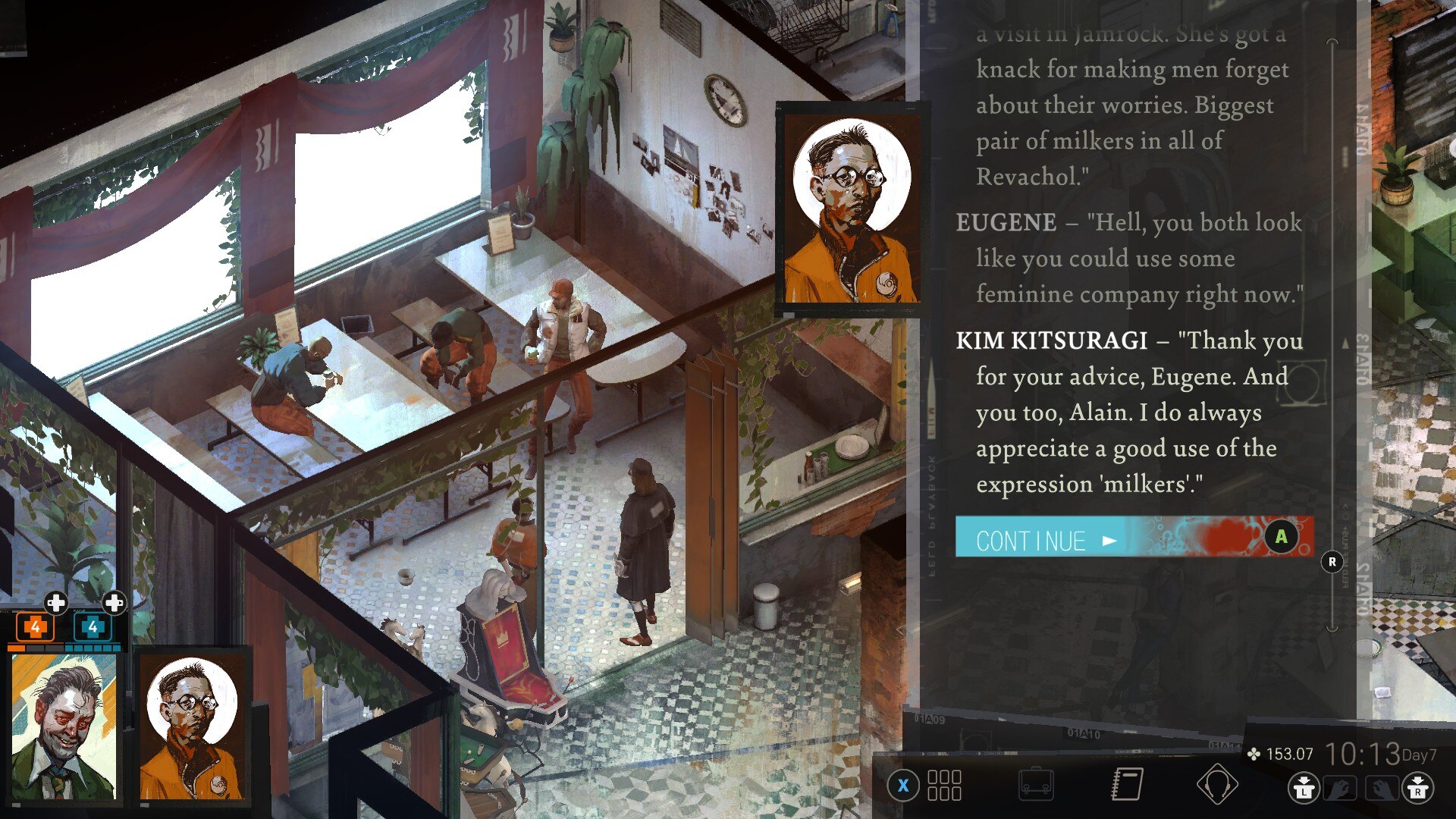This game wasn’t in my backlog, strictly speaking, but I put off getting a copy for a long time so it sort of counts. Either way this game is a blast so I’m going to talk about it.
Disco Elysium might be the most pretentious game I’ve ever played. I don’t mean that in a bad way, but I can’t think of another game that will just throw French at you to this extent and just, hope you get it. It’s also the most adult game I’ve ever played, not in terms of it being inappropriate for kids necessarily, but if you gave this to a kid they wouldn’t get it at all. Heck, I’m not sure I fully got it. Maybe I’ll return to Disco Elysium when I’m the protagonist’s age and see if it hits different. It really relies on you bringing your own life experience and ideology to it and that will probably enhance or detract from your experience.
Disco Elysium is also the most “literature” of any game I’ve ever played. On one hand I mean this very literally, as the gameplay consists entirely of walking around town and talking to people, with outcomes dependent on skill checks. There’s no combat and no relfex-based gameplay. On a more conceptual level, this game has a lot to say and the writing used to convey that is incredible. You read this game like it’s a book and if it was a book it’d be a NYT Bestseller. That’s not to say Disco Elysium doesn’t benefit from being a game, because the gameplay really involves you in the story and allows it to be told in this circuitous, organic way that isn’t possible in a novel. But the gameplay serves the story, not the other way around.
As for the story, you play as a cop investigating a murder in the worst part of town during a labor strike. Tensions in the neighborhood are high and there are worries that if the murder case isn’t resolved things could escalate into violence. One problem: you’re a depressed alcoholic with a drug addiction and have completely lost your memory after a huge bender. Half of the game’s conflict is having to deal with the main character’s inner demons, on top of the strike and the murder itself. Honestly this setup made the beginning of the game a bit hard to get into for me, on account of not knowing who you are or where you are or what anything is or what’s going on. On top of that, it really seems, at first glance, that the protagonist is a massive douchebag. This made me feel bad for the people around him more than it made me want to play the game as him. But if you push through, and I suppose depending on how you role-play, you realize that he’s a more complicated guy than that and that the situation you’re in is more complicated than it initially appears.
The game world initially just seems like a fictionalized hodgepodge of eurasia (which is fun by itself). As you learn/remember more about the setting it’s revealed that there are way more fantasy/sci-fi elements there than you probably expected. This serves to disorient you to the benefit of the experience because, like the main character, you aren’t able to trust your basic preconceptions about the world. Interestingly, a lot of the really creative worldbuilding has no impact on the murder investigation at all. On some level it’s a bit disappointing to me because I love high concept fantasy shit but it works well here to contextualize the murder mystery and the main character’s mental struggles as relatively low-grade problems in a fully-fleshed out world of international conflict and possibly-impending apocalyptic doom. The game is confined to one neighborhood of one district of one city, which keeps it focused on the characters and their ideas. If Skyrim is a two-foot deep sea, Disco Elysium is Lake Baikal, or maybe a cenote.
I’ve somehow gotten this deep into this post without mentioning that most of the conversations in the game are with elements of the main character’s psyche. Skills like “endurance” and “savoir-faire” will chime in during dialog or as you explore to give input and its quality depends on the level of the skill. A lot of gameplay elements are made diegetic in similar ways. Other characters will comment on how relentless the main character is, running constantly and taking no breaks (because as a player, you’re just playing a game and going from clue to clue). They also mention his “relentless” questioning style where he appears to be cycling through a list of hyper-specific questions (the game’s dialog trees). It’s very fun and I like it.
Finally, the characters are A+. None are wasted, if you can talk to someone, they’re interesting. Even conversations that initially seem frivolous can circle back around to helping the investigation or helping the main character cope with himself. Your partner, Lt. Kim Kitsuragi, is a fantastic character and legendary in how much of your shit he puts up with. Tessa had a hot take about him which is that “he’s like Isabelle in Animal Crossing, where they had to make someone who’s incredibly patient with you, and as a result made a very likeable character.” Cuno the vulgar child is also fun, but everyone mentions those two. Here are some other memorable ones: the group of EDM-youths, the distressingly accurate portrayal of a programmer, the cryptozoologist, the perpetually-exasperated cafeteria manager, and The Pigs.
Anyway, don’t make my mistake, go play this game now if you haven’t already.
[[ backlog master post ]]